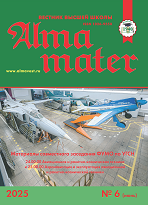Larisa P. Petukhova, Cand. Sc. (Pedagogy), Assistant Professor, I.G. Petrovsky Bryansk State University, Bryansk city, e-mail: petuhowa.larisa@yandex.ru
Natalia V. Seregina, Cand. Sc. (Pedagogy), Assistant Professor, I.G. Petrovsky Bryansk State University, Bryansk city, e-mail: nata0479@yandex.ru
Natalia P. Katunina, Dr. Sc. (Biology), Professor, I.G. Petrovsky Bryansk State University, Bryansk city, e-mail: npkatunina@mail.ru
Elena N. Stratienko, Dr. Sc. (Medicine), Professor, I.G. Petrovsky Bryansk State University, Bryansk city, e-mail: stratienko@list.ru
Elena V. Eliseeva, Cand. Sc. (Pedagogy), Professor, I.G. Petrovsky Bryansk State University, Bryansk city, e-mail: eev20071@yandex.ru
The article presents the results of a study of the relationship between perfectionism and aggression in adolescents. The study of this relationship is relevant because teenagers who have a strong desire to achieve the ideal can experience significant pressure, and if they do not achieve their high standards, this can cause frustration and aggression, both directed at themselves and others. When studying the research problem, methods were used to study the relationship between indicators of perfectionism and aggressiveness in adolescents. Correlation analysis revealed the presence of statistically significant links between the components of perfectionism and aggression. Self-directed perfectionism, aimed at achieving ideal standards for maintaining self-esteem, correlates with indicators of indirect aggression and irritation.
The analysis of variance confirmed the statistically significant influence of socially prescribed perfectionism on aggression, in particular, such as physical and verbal aggression, irritation and suspicion. These data suggest that adolescents who are focused on the expectations of others may be prone to aggressive moods when they do not meet the demands imposed by society. The results of the study confirmed the hypothesis of the relationship between perfectionism and aggressiveness in adolescence.
Keywords: perfectionism, aggressiveness, adolescents, correlation, factor analysis, interrelation
References
1. Garanyan, N.G. Psychological models of perfectionism. Voprosy psychologii. 2009. No. 5. P. 74–83.
2. Guryanova, V.S. Study of the level of perfectionism of adolescents. Student Vestnik. 2021. No. 2-1 (147). P. 65–67. EDN WSQLXL.
3. Kim, K.V., Alekseeva, V.V. Features of perfectionism manifestation as a destructive form of behavior. Vestnik of the North-Eastern Federal University named after M.K. Ammosov. 2020. No. 4. P. 11–19.
4. Kirichenko, O.N., Raspopova, A.S. Features of the relationship between perfectionism and anxiety of adolescents. Actual issues of physical culture and sport. 2018. Vol. 20. P. 129–133.
5. Larskikh, M.V. Individual-typological determinants of student perfectionism. Izvestiya Voronezh State Pedagogical University. 2015. No. 2 (267). P. 227–231.
6. Pavlenko, T.A. Perfectionism and aggression in adolescence (in pupils of 9–10th classes). Society: sociology, psychology, pedagogy. 2019. No. 4. P. 23–28.
7. Ulyanov, A.V. Phenomenon of perfectionism in the modern world. Vestnik of Siberian State University of Railway Engineering. 2014. No. 31. Pp. 195–203.
8. Yasnaya, V.A., Enikopov, S.N. Modern models of perfectionism. Psychological research [Electronic resource]. URL: http://psystudy.ru/index.php/num/2013v6n29/826-yasnaya29.html (accessed on: 07.01.2025).











.png)






